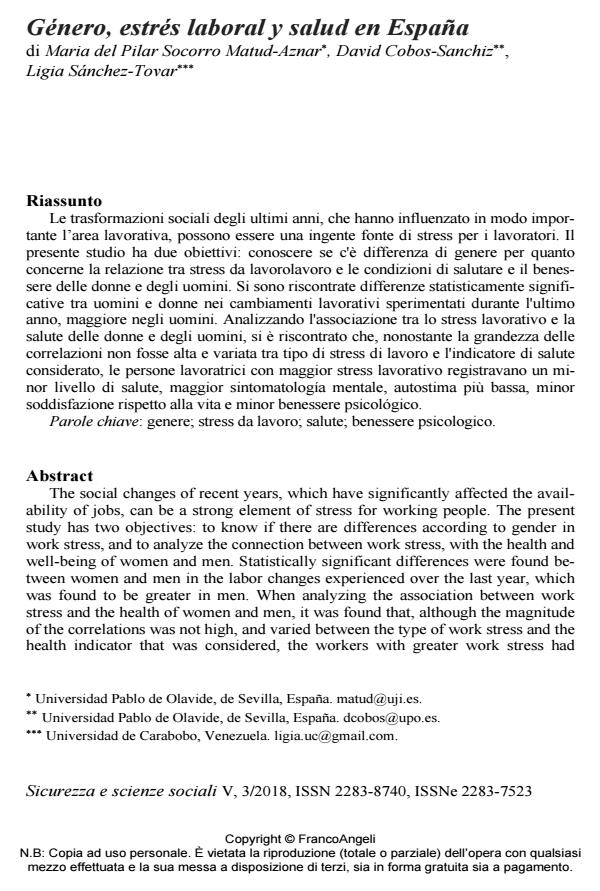Género, estrés laboral y salud en España
Journal title SICUREZZA E SCIENZE SOCIALI
Author/s Maria del Pilar Socorro Matud-Aznar, David Cobos-Sanchiz, Ligia Sánchez-Tovar
Publishing Year 2019 Issue 2018/3
Language Spanish Pages 14 P. 151-164 File size 167 KB
DOI 10.3280/SISS2018-003011
DOI is like a bar code for intellectual property: to have more infomation
click here
Below, you can see the article first page
If you want to buy this article in PDF format, you can do it, following the instructions to buy download credits

FrancoAngeli is member of Publishers International Linking Association, Inc (PILA), a not-for-profit association which run the CrossRef service enabling links to and from online scholarly content.
The social changes of recent years, which have significantly affected the avail-ability of jobs, can be a strong element of stress for working people. The present study has two objectives: to know if there are differences according to gender in work stress, and to analyze the connection between work stress, with the health and well-being of women and men. Statistically significant differences were found between women and men in the labor changes experienced over the last year, which was found to be greater in men. When analyzing the association between work stress and the health of women and men, it was found that, although the magnitude of the correlations was not high, and varied between the type of work stress and the health indicator that was considered, the workers with greater work stress had worse health, greater mental symptoms, lower self-esteem, less satisfaction in general with life, and less psychological well-being.
Le trasformazioni sociali degli ultimi anni, che hanno influenzato in modo importante l’area lavorativa, possono essere una ingente fonte di stress per i lavoratori. Il presente studio ha due obiettivi: conoscere se c'è differenza di genere per quanto concerne la relazione tra stress da lavorolavoro e le condizioni di salutare e il benessere delle donne e degli uomini. Si sono riscontrate differenze statisticamente significative tra uomini e donne nei cambiamenti lavorativi sperimentati durante l'ultimo anno, maggiore negli uomini. Analizzando l'associazione tra lo stress lavorativo e la salute delle donne e degli uomini, si è riscontrato che, nonostante la grandezza delle correlazioni non fosse alta e variata tra tipo di stress di lavoro e l'indicatore di salute considerato, le persone lavoratrici con maggior stress lavorativo registravano un minor livello di salute, maggior sintomatología mentale, autostima più bassa, minor soddisfazione rispetto alla vita e minor benessere psicológico.
Keywords: Gender; laboral stress; health; psychological well-being.
Maria del Pilar Socorro Matud-Aznar, David Cobos-Sanchiz, Ligia Sánchez-Tovar, Género, estrés laboral y salud en España in "SICUREZZA E SCIENZE SOCIALI" 3/2018, pp 151-164, DOI: 10.3280/SISS2018-003011